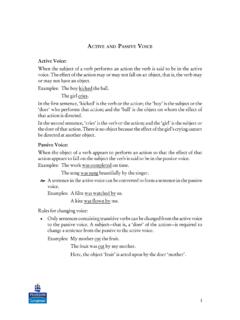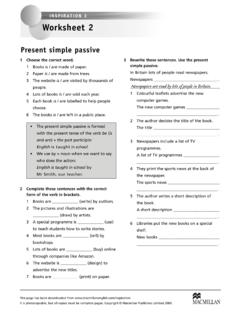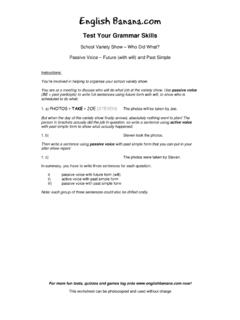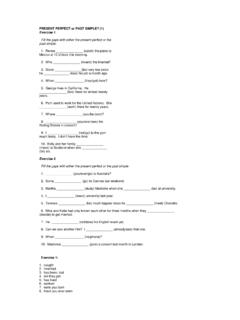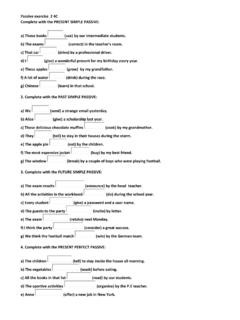Transcription of Present, Past and Future Passive - English for everyone
1 present , past and Future Passive In the active voice, the subject is active: it does something. In the Passive voice, the subject is Passive : something happens to it. In the Passive voice the action is more important than the subject either because the subject is not important or because it is unknown. When rewriting active sentences into Passive , the following changes take place: The object of the active becomes the subject of the Passive sentence. Then the to be verb will indicate the tense of the sentence and it will come followed by the past participle of the main verb denoting the action. The subject in the active becomes the agent complement of the Passive and it is introduced by the preposition by at the end of the sentence only when it is important to name it, if not, it is dropped.
2 Passive VOICE IN THE present simple 1. Form: Affirmative: Subject + to be (am, is, are) + past participle Negative: Subject + to be (am, is, are) not + past participle Interrogative: To be (am, is, are) + subject + past participle 2. Examples: Affirmative: Tom writes a letter every week. (active) A letter is written every week by Tom. ( Passive ) Negative: Tom doesn t write a letter every week. (active) A letter isn t written every week by Tom. ( Passive ) Interrogative: Does Tom write a letter every week? (active) Is a letter written every week by Tom? ( Passive ) Passive VOICE IN THE past simple 1.
3 Form: Affirmative: Subject + to be (was, were) + past participle Negative: Subject + to be (wasn t, weren t) + past participle Interrogative: To be (was, were) + subject + past participle 2. Examples: Affirmative: Tom wrote a letter last week. (active) A letter was written last week by Tom. ( Passive ) Negative: Tom didn t write a letter last week. (active) A letter wasn t written last week by Tom. ( Passive ) Interrogative: Did Tom write a letter last week? (active) Was a letter written last week by Tom? ( Passive ) Passive VOICE IN THE Future simple 1. Form: Affirmative: Subject + will be+ past participle Negative: Subject + won t be + past participle Interrogative: Will+ subject + be + past participle 2.
4 Examples: Affirmative: Tom will write a letter tomorrow. (active) A letter will be written tomorrow by Tom. ( Passive ) Negative: Tom won t write a letter tomorrow. (active) A letter won t be written tomorrow by Tom. ( Passive ) Interrogative: Will Tom write a letter tomorrow? (active) Will a letter be written tomorrow by Tom? ( Passive )

